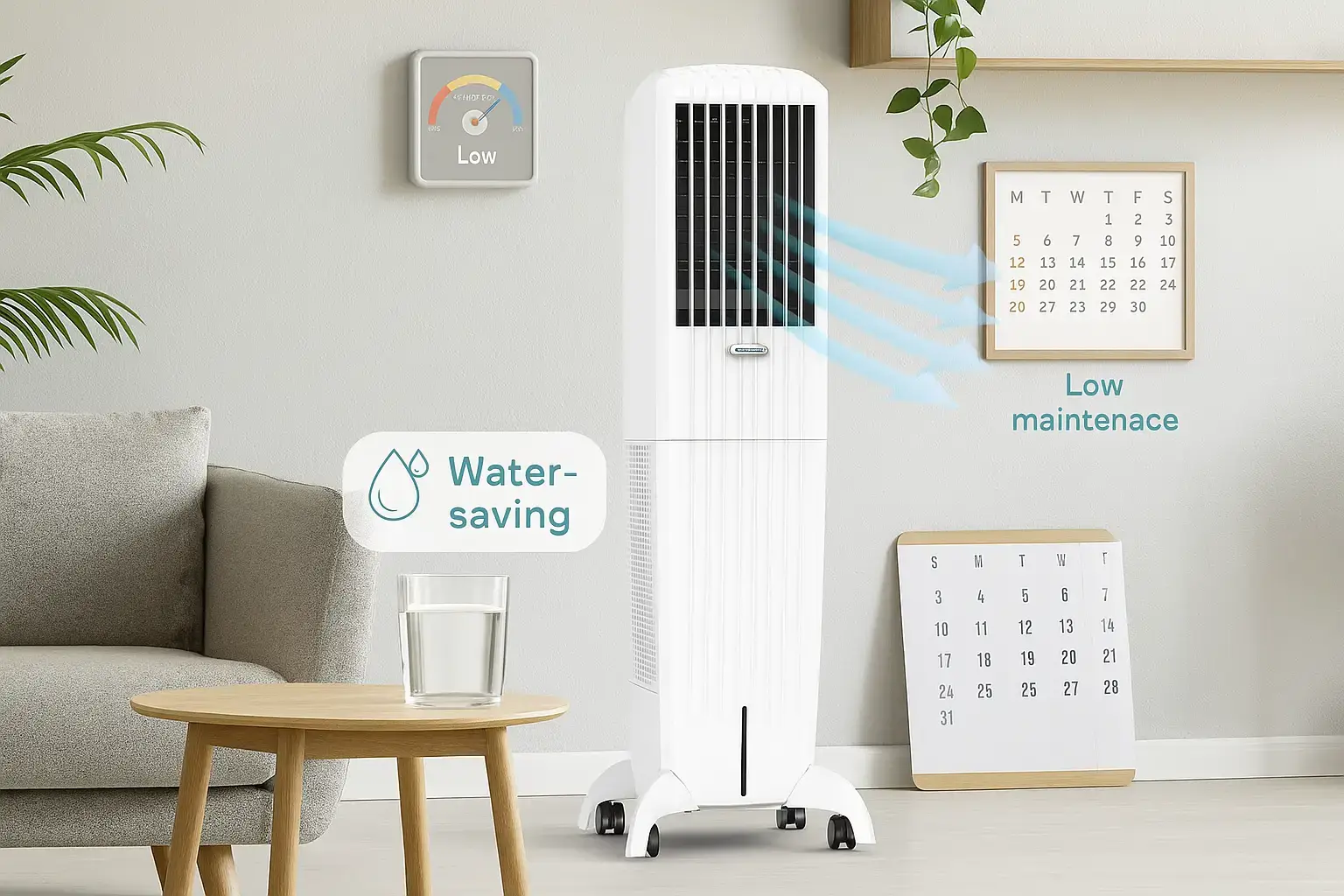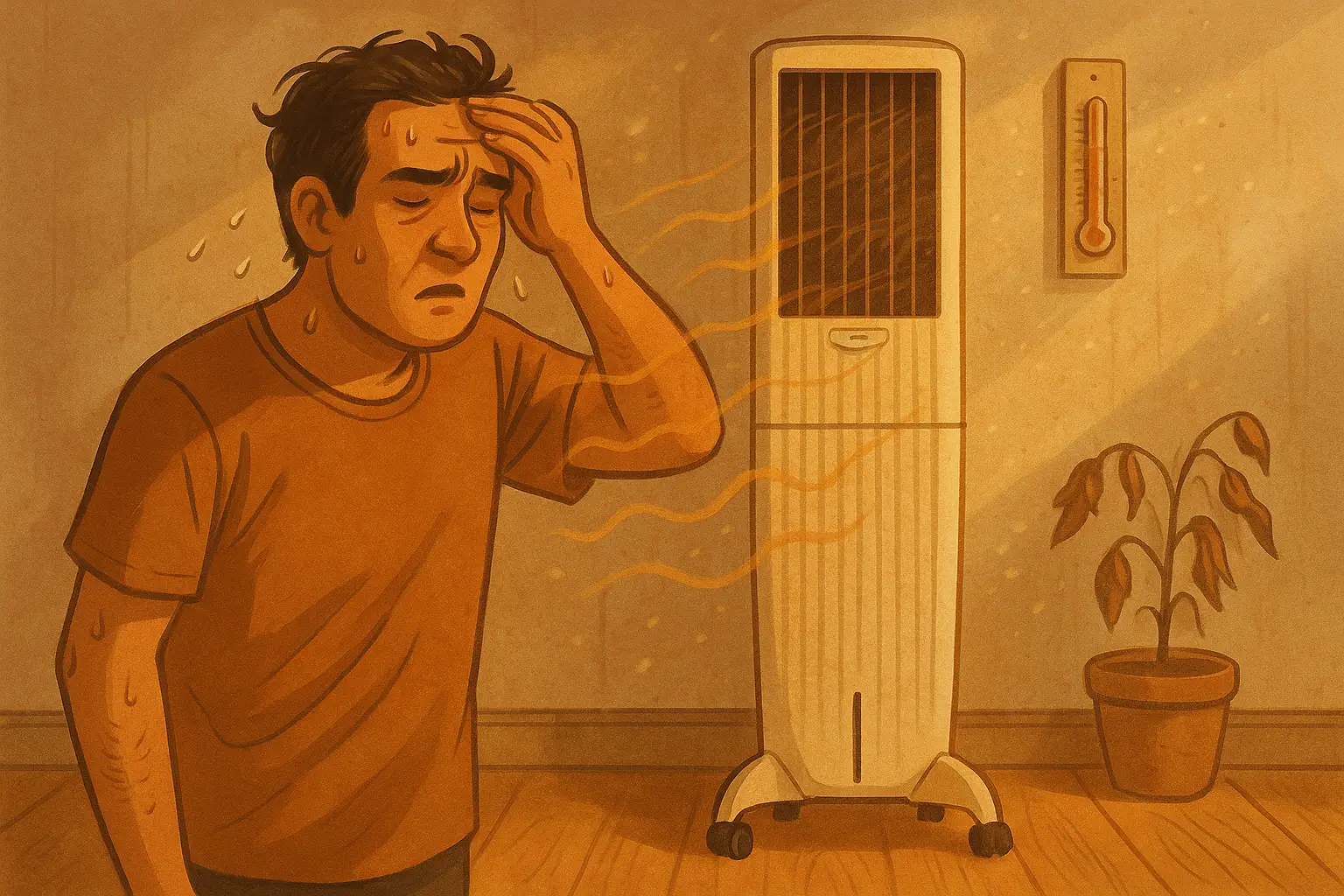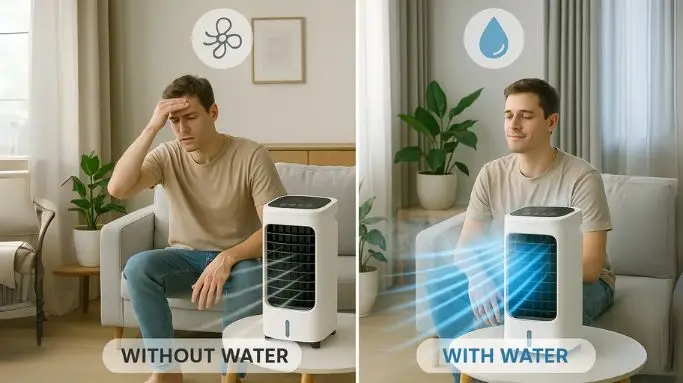Air coolers, also known as evaporative coolers or swamp coolers, are a popular and cost-effective solution for cooling homes and offices, especially in hot, dry climates. They work by using water to cool the air, making them energy-efficient alternatives to traditional air conditioners. However, one question that often arises is: Can you use an air cooler without water?
In this article, we will explore whether it’s possible to operate an air cooler without water, the impact of doing so, and the situations where it might be acceptable. Let’s dive into the details to understand the pros, cons, and working mechanism of an air cooler without water.
What Is an Air Cooler and How Does It Work?
An air cooler, or evaporative cooler, is a device designed to cool the air by utilizing water evaporation. These coolers work by drawing warm, dry air into the system, passing it through wet cooling pads, and then blowing out cool, moist air into the room. This evaporation process absorbs heat from the air, resulting in a cooling effect that refreshes your living space.
There are various types of air coolers, including:
- Room coolers
- Personal coolers
- Tower coolers
- Window coolers
- Desert coolers
Each type offers different cooling capacities, but all rely on water to achieve the cooling effect. Water is the key element in this process as it allows the heat to be absorbed from the air, lowering the temperature in the surrounding area.
The Role of Water in an Air Cooler
Water is essential for the proper functioning of an air cooler. The cooling effect in an air cooler is primarily generated through the evaporation of water. Without water, an air cooler cannot effectively cool the air, and it will fail to provide the intended cooling benefits. Additionally, water helps to humidify the air, which is particularly beneficial in dry environments. Humidified air can improve your skin, eyes, and respiratory system, especially in places where the air is excessively dry.
- Water helps in cooling: The process of evaporation cools the air as it passes through water-soaked pads.
- Water helps in humidification: This is important to prevent dry skin, eyes, and throat, especially in arid climates.
- Water usage varies: Depending on temperature, humidity, and airflow, air coolers typically consume anywhere from 3 to 15 liters of water per hour.
Can You Use an Air Cooler Without Water?
Yes, it is possible to use an air cooler without water, but doing so significantly alters its functionality. Without water, the air cooler effectively becomes just a fan, circulating air without any cooling effect. The lack of water eliminates the cooling mechanism and may lead to slightly warmer air in some cases, as the fan motor generates heat.
- When you use an air cooler without water: The cooler will still circulate air, but it will not lower the temperature. It will only serve as a fan, moving air around the room but without the cooling effect that water provides.
- What happens with dry air: The air will remain dry, which may result in discomfort, particularly for those sensitive to dry air. You might experience irritation to your skin, eyes, or throat, especially in areas with low humidity.
Advantages of Using an Air Cooler Without Water
While using an air cooler without water isn’t ideal for cooling, there are certain situations where this might be acceptable:
- Saving water: If you are in an area where water is scarce or expensive, using the air cooler without water can help reduce water consumption and lower utility costs.
- Reducing humidity: In regions with high humidity, using an air cooler without water can help reduce the excess moisture in the air, potentially improving comfort. It helps prevent mold, mildew, and dust mites from growing, which can improve air quality.
- Less maintenance: When used without water, there’s no need to refill the tank or clean the wet pads regularly, which can save you time and effort in maintenance.

Disadvantages of Using an Air Cooler Without Water

While there are some benefits to using an air cooler without water, there are several drawbacks to consider:
- No cooling effect: The most significant disadvantage is the lack of cooling. Without water, the air cooler cannot lower the room temperature, leaving you with a fan that merely circulates warm air.
- No humidification: Air coolers help humidify the air, which can be beneficial in dry environments. Using an air cooler without water will result in dry air, which can irritate your skin, eyes, and respiratory system.
- No air purification: The absence of water means that the cooler will not purify the air as effectively. Dust, pollen, and other allergens will continue to circulate, potentially worsening air quality.
When Should You Consider Using an Air Cooler Without Water?
While using an air cooler without water is generally not recommended for cooling purposes, there are certain scenarios where it might be acceptable:
- In high humidity environments: When the outdoor humidity is already high, using an air cooler without water can prevent excessive moisture from accumulating in the air. It may help improve comfort and prevent dampness in the room.
- For air circulation: If you are simply looking to circulate the air in a room without cooling, an air cooler without water can provide gentle air movement without the need for cooling.
- When away for extended periods: If you’re going to be away from home for a while and want to prevent water from stagnating in the tank, you might choose to run the cooler without water. This can help keep the cooler clean and prevent mold or bacterial growth.
- During mild weather: If the temperature is moderate and you don’t need the cooler to cool the air, running the cooler without water can provide some airflow and help maintain ventilation without overcooling.
Conclusion: Should You Use an Air Cooler Without Water?
Using an air cooler without water is possible, but it compromises the main functionality of the device — cooling and humidifying the air. While there are some scenarios where running the cooler without water can be helpful, it is generally not recommended for most situations. The absence of water means you won’t experience the intended cooling effect, and the air can become dry and uncomfortable, especially in low-humidity environments.
If you’re looking for an effective and energy-efficient way to cool your space, it’s best to use your air cooler with water. This will ensure that the evaporative cooling process works as intended, providing you with cool, comfortable air and improved indoor air quality.
Ultimately, the decision to use an air cooler without water depends on your specific needs and environmental conditions. If you want to maintain optimal performance and get the most out of your air cooler, always ensure it has sufficient water to facilitate proper cooling and humidification.
FAQs About Using an Air Cooler Without Water
Can You Use an Air Cooler Without Water? Here’s What You Need to Know
What happens when I use my air cooler without water?
<span style="font-weight: 400;">When used without water, an air cooler will simply act as a fan. It will circulate air, but without the cooling effect provided by the water evaporation process. The air may even feel warmer due to the fan motor generating heat.</span>
Can an air cooler without water be used in a humid environment?
<span style="font-weight: 400;">Yes, in high humidity environments, using an air cooler without water can help reduce moisture levels and prevent excess humidity in the room, offering comfort without overhumidifying the space.</span>
Will an air cooler without water still clean the air?
<span style="font-weight: 400;">No, air coolers with water act as a mild purifier by filtering dust and allergens through the wet pads. Without water, the air cooler will not purify the air as effectively.</span>
Is it safe to use an air cooler without water for long periods?
<span style="font-weight: 400;">It is not recommended to run an air cooler without water for extended periods. The lack of water could cause the fan to run dry, leading to potential damage or reduced lifespan of the unit.</span>
Can I use an air cooler without water during the winter?
<span style="font-weight: 400;">In winter, the use of an air cooler without water is more acceptable as the humidity levels are usually lower, and you may not need cooling. It can function like a fan for air circulation.</span>
